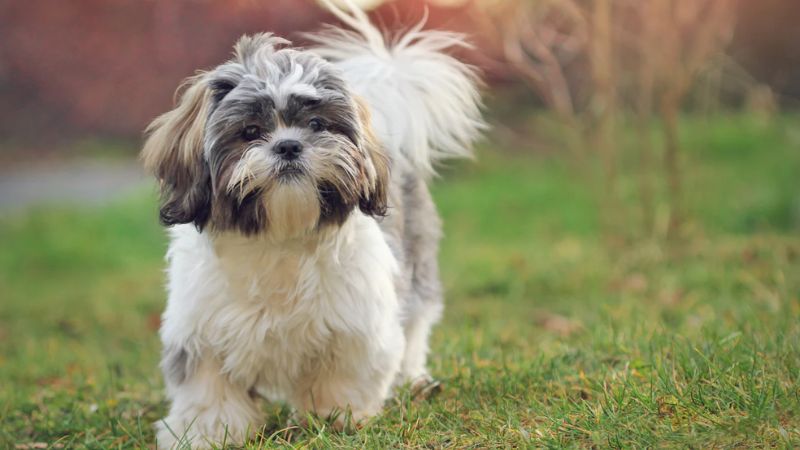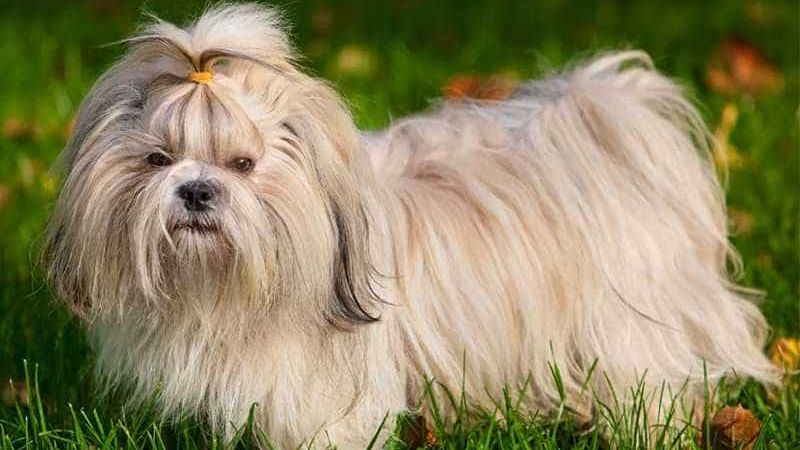The Shih Tzu, also known as the Shih Tzu Lion Dog, Shih Tzu Tibetan Lion Dog, or Tibetan Lion Dog, is a small and adorable dog breed that has become a popular companion for pet owners. Let’s explore more about this charming breed with Bach Hoa XANH!
1 All About the Shih Tzu
Origin of the Shih Tzu
The Shih Tzu originated in Tibet, China, with a history dating back approximately 10,000 years, even preceding the Tibetan Mastiff.
Since ancient times, the Shih Tzu has been a symbol of prosperity and peace, earning its place as a cherished companion of Chinese royalty. In 1861, a Chinese empress introduced the breed to England, where they were treated like royalty themselves.
Over time, the Shih Tzu gained popularity across Europe and made its way to Vietnam in recent years. However, their presence in Vietnam is relatively new, within the last five years, as they struggle to adapt to the local climate.
 The Shih Tzu originated in China
The Shih Tzu originated in China
Physical Characteristics of the Shih Tzu
Standing at a mere 10–20 cm tall and weighing between 3–8 kg, the Shih Tzu is a compact breed. It takes about ten months for a Shih Tzu to reach adulthood, provided they receive adequate nutrition.
Their body is slightly longer than their height, giving them a sturdy appearance. Shih Tzus have round heads with a short muzzle, an underbite, large drooping ears, round and slightly protruding eyes, a turned-up nose, and a small, adorable mouth.
Shih Tzus are known for their long, smooth, and straight coats, which require regular grooming and styling. Their fur can come in various colors, including yellow, cream, white, yellow-mixed, brown, and black.
Being accustomed to colder climates, Shih Tzus can be challenging to keep in Vietnam. As a result, breeders have created Shih Tzu hybrids by crossing them with other small, long-haired breeds, such as the Japanese Spitz, Poodle, and Pekingese.
 Physical characteristics of the Shih Tzu
Physical characteristics of the Shih Tzu
Personality Traits
Shih Tzus are friendly, cheerful dogs that love to bond with their owners. However, they can be shy and cautious around strangers.
With a low exercise requirement, Shih Tzus are well-suited for small apartments. Nonetheless, they are playful and may need toys to keep them entertained and prevent them from chewing on your belongings!
Due to their aristocratic heritage, Shih Tzus may exhibit a hint of stubbornness and arrogance. Early training and socialization are essential to ensure they grow into well-behaved companions.
Daily attention, petting, and playtime are crucial for Shih Tzus, and they will appreciate occasional walks to explore the outside world and socialize.
 Personality traits of the Shih Tzu
Personality traits of the Shih Tzu
2 Caring for Your Shih Tzu
Feeding Your Shih Tzu
It is recommended to feed your Shih Tzu 3–4 meals a day, maintaining a fixed schedule to monitor their daily food intake. Shih Tzus love to eat and can quickly become obese if overfed.
To ensure your Shih Tzu has sufficient energy, provide a diet rich in proteins, fats, minerals, and vitamins. Include foods like chicken, beef, fish, and organ meats. Additionally, offer them rice or porridge to provide carbohydrates for muscle development, and don’t forget to supplement with calcium for strong bones.
You can use specialized dog food for your pet. However, it’s best to limit human food, as it can disrupt their digestive system.
 Provide a balanced diet for your Shih Tzu
Provide a balanced diet for your Shih Tzu
Grooming and Hygiene
Shih Tzus have long, fast-growing hair that requires daily brushing to maintain a smooth, tangle-free coat. Regular grooming also allows you to detect any skin or coat abnormalities early on.
Bathe your Shih Tzu about once a week or as needed, using specialized dog shampoos. Clean their ears and eyes weekly with appropriate canine eye and ear care products. Don’t forget to trim their nails quarterly.
 Establish a regular grooming routine for your Shih Tzu
Establish a regular grooming routine for your Shih Tzu
Common Health Issues
Shih Tzus have an average lifespan of around 15 years and are generally easy to care for. Common minor health issues include ear infections, cataracts, respiratory problems, and patellar luxation.
 Common health issues in Shih Tzus
Common health issues in Shih Tzus
Things to Keep in Mind
Shih Tzus thrive on attention and companionship. Make sure to set aside time each day to play and interact with them, and take them for walks to prevent loneliness and encourage socialization.
 Spend quality time with your Shih Tzu daily
Spend quality time with your Shih Tzu daily
Maintain a regular vaccination and deworming schedule, and don’t skip those vet visits! It is recommended to take your furry friend for a check-up every six to twelve months.
When purchasing a Shih Tzu, choose a reputable breeder who prioritizes health and provides a complete vaccination record. Avoid taking your puppy home until they have received their full set of initial vaccinations.
3 Buying a Shih Tzu
Shih Tzu Price Range
In Vietnam, purebred Shih Tzus are relatively affordable, typically costing between 5–7 million VND.
Shih Tzus imported from Thailand may be slightly more expensive, ranging from 8–10 million VND.
As purebred Shih Tzus are scarce, some breeders cross them with other small, long-haired breeds, such as the Japanese Spitz or Pekingese.
 Shih Tzu prices vary based on origin and purity
Shih Tzu prices vary based on origin and purity
Things to Consider When Buying a Shih Tzu
Young Shih Tzus may closely resemble their purebred counterparts, making it challenging to distinguish them without experience. Purebred Shih Tzus will have longer, straighter, and smoother coats by the time they are three months old.
Avoid online purchases, as they are prone to scams. Instead, opt for reputable breeders or well-known pet shops. Pay attention to the dog’s physical characteristics and health before making a purchase, and don’t forget to compare prices.
 Many people choose Shih Tzus as their furry companions
Many people choose Shih Tzus as their furry companions
Investigating the Features, Maintenance, and Expense of Border Collie Breeds
Experts weigh in on the reasons behind the loving bond between people and Border Collies. Find out why these dogs have earned such a special place in people’s hearts as well as the key characteristics that make them so unique. Plus, get a grasp on the expenses to watch for when taking on the responsibility of owning a Border Collie.





































